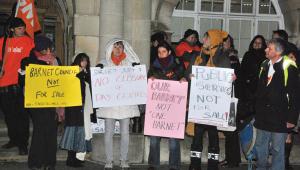What a year it was. A new form of government, hitherto unseen reform of the public sector and a huge reduction programme. By this time next year, we will know how successful it all was
When we come to look back on 2011, this time next year, will we understand the full impact of the reforms announced by the coalition? The speed and scale of the public service changes made during 2010 and 2011 will have proved far more radical than anything attempted by Margaret Thatcher. The benefits system, regional planning, universities, social housing, prisons, public health, schools, NHS commissioning and regulation will all have been up-ended. Even in December 2011, we might not be near the end-point of reforms such as ‘localism’ and the Big Society.
As the government’s second calendar year approaches it is clear that the top ministers have learned a vital lesson from Tony Blair. The coalition wants to initiate all its most dramatic reforms within its first 18 months in office. There will be as few consultations, pilots and tiny specific grants as possible. Instead, we will have seen a ‘feet first’ approach to public service reform.
Commentators who believed that coalition government would inevitably be weak (including me) were as wrong as it is possible to be. The Cameron-Clegg administration is brave to the point of foolhardy. Labour will have to learn from this: it is no use pussyfooting around attempting to appease every interest. Indeed, ministers appear happy to aggravate everyone from the poor, via the ‘squeezed middle’ to the rich.
The strategy is clear enough: get the bad stuff over in 2010 and 2011 so that sunlit uplands can be seen in 2013 and 2014. The importance of anticipation cannot be exaggerated. Recent marches and demonstrations against university fees and council budgets are a harbinger of an expected nasty future. For the whole of 2010, the public sector has been looking ahead and dreading ‘the cuts’.
During 2011, however, a ‘new normal’ will emerge where public services have to live with the full effect of declining budgets. At this point councils, the police, public transport, Whitehall departments and quangos will be able to envision the future with less fear than they have since the general election. Moreover, the government will, by the end of 2011, have to start taking the blame for, say, lengthening hospital waiting lists – and much more.
It is almost inevitable that a public service ‘crisis’ will occur at some point during 2011. We will then see how far ministers will be able to stand back and, in the spirit of the new localism, say ‘nothing to do with us’. When a tabloid demands that ‘something must be done’ after, say, a shortage of grit for icy roads, a mishandled child cruelty case or a fire in a care home, will ministers step in? If they do, localism will be destroyed.
More optimistically, the first fruits of the Big Society should be visible. Councils and health providers will start to experiment with new forms of commissioned services. There should also be some leading indicators of how far entrepreneurialism among existing public servants can be turned into new forms of ownership and provision.
Indeed, 2011 will herald the start of the first financial year of the post-Labour era, including a New Year hike in VAT to 20%. March 31 will be the last day of the ‘old world’ of Blair and Brown, where public sector budgets start to fall away.
But it will also, if the Office for Budget Responsibility is correct, be the beginning of the return to health for Britain’s public finances. By Christmas 2011, we will know whether or not there will be a double-dip recession and whether the coalition is truly durable. What a year lies ahead.
Tony Travers is director of the Greater London Group at the London School of Economics










